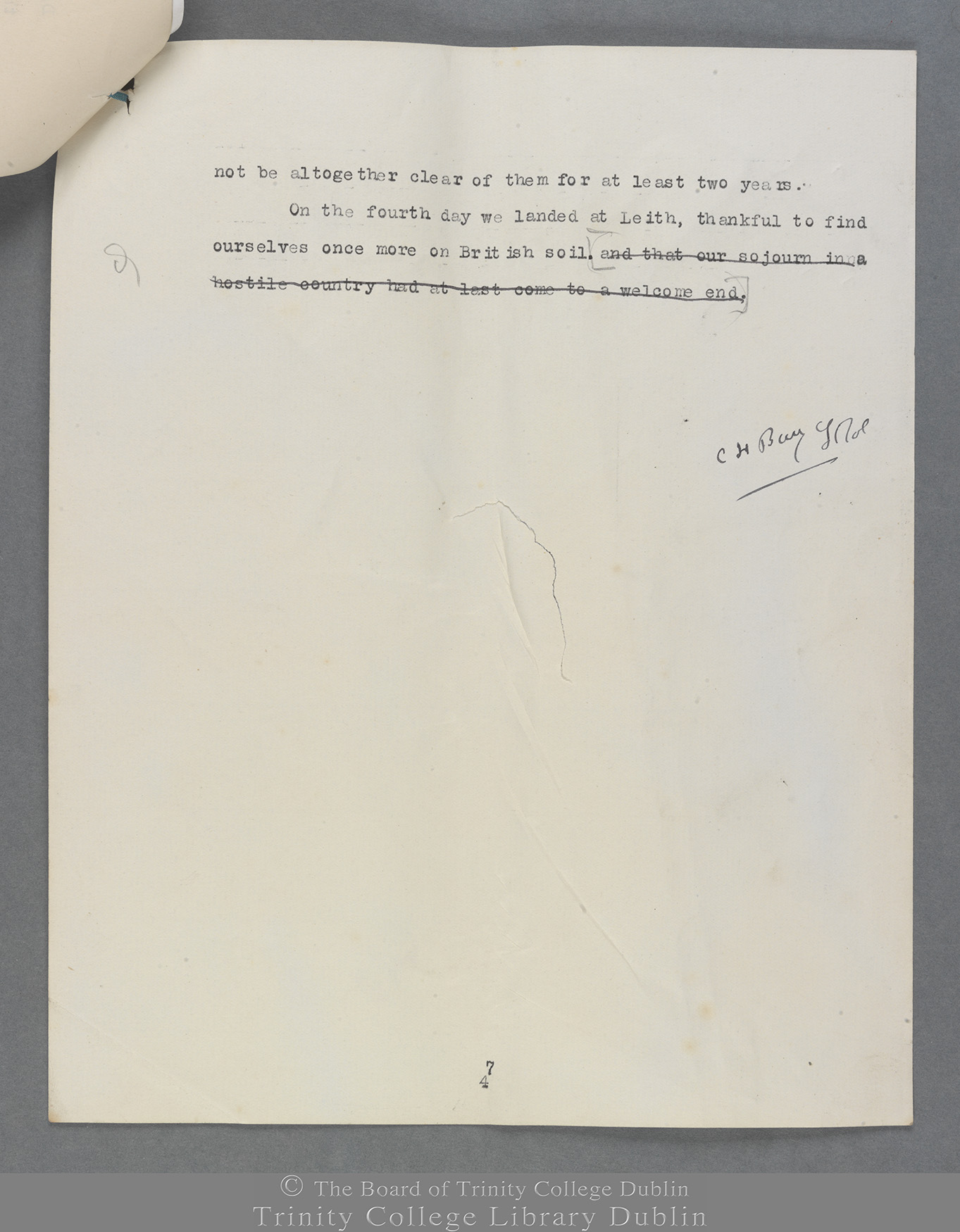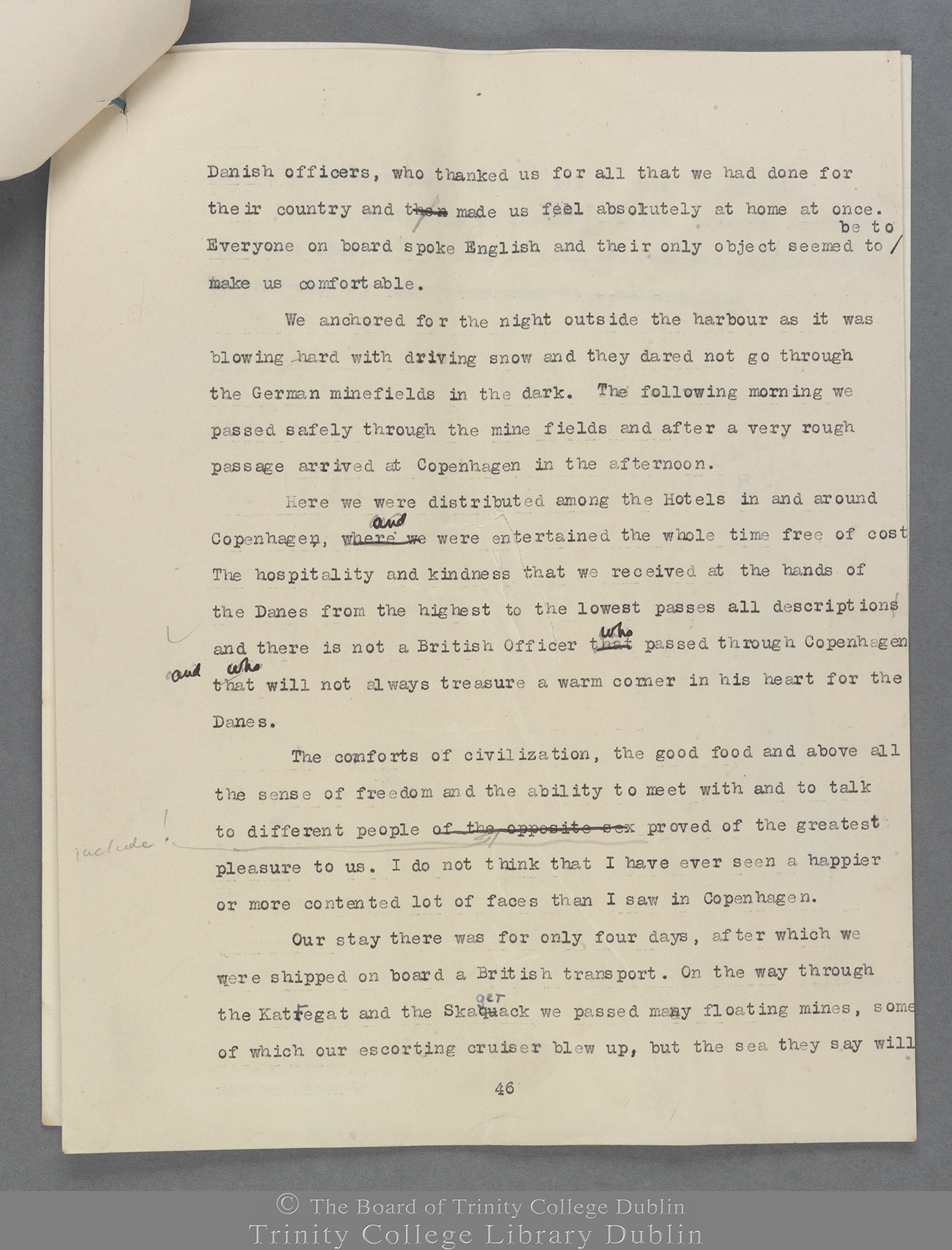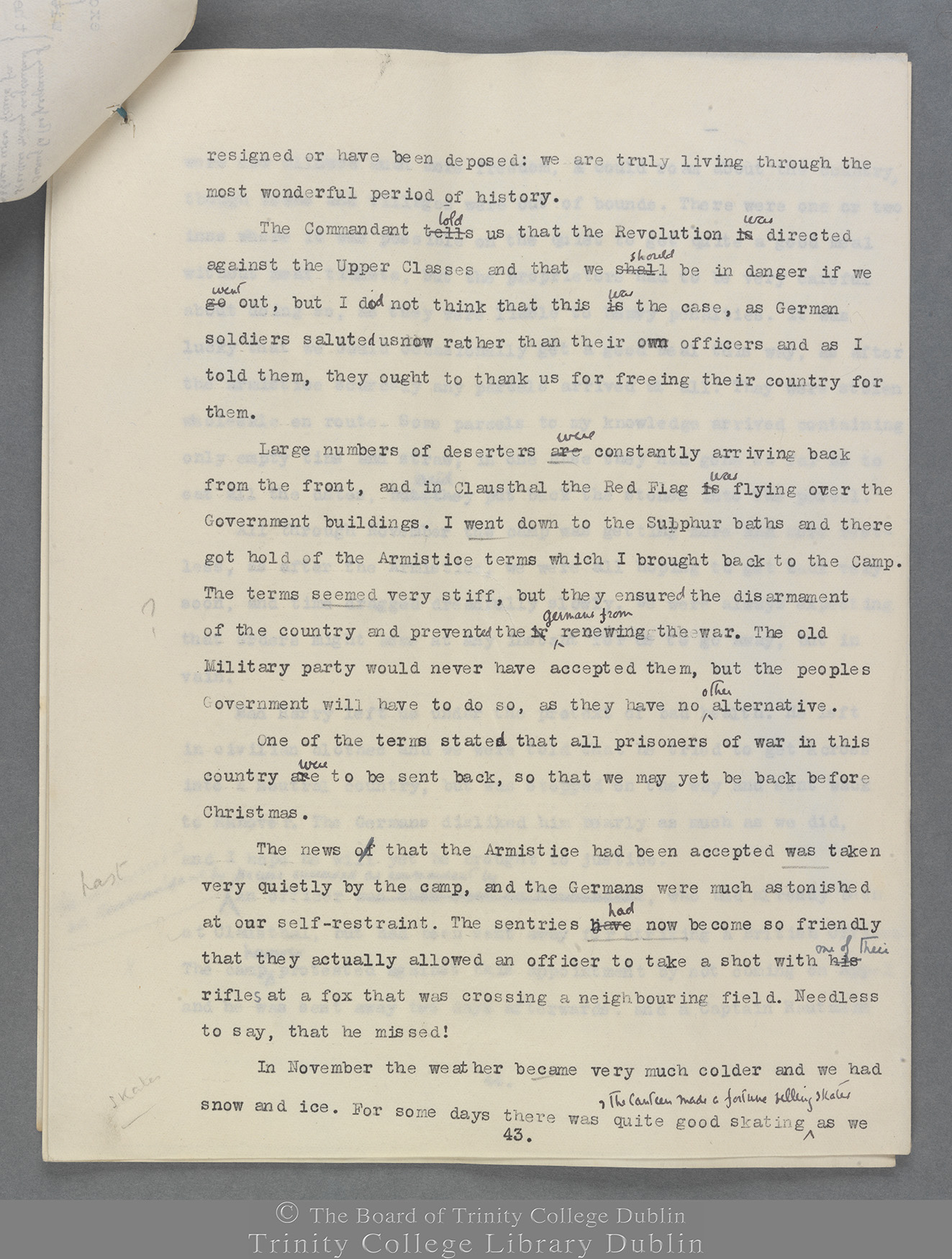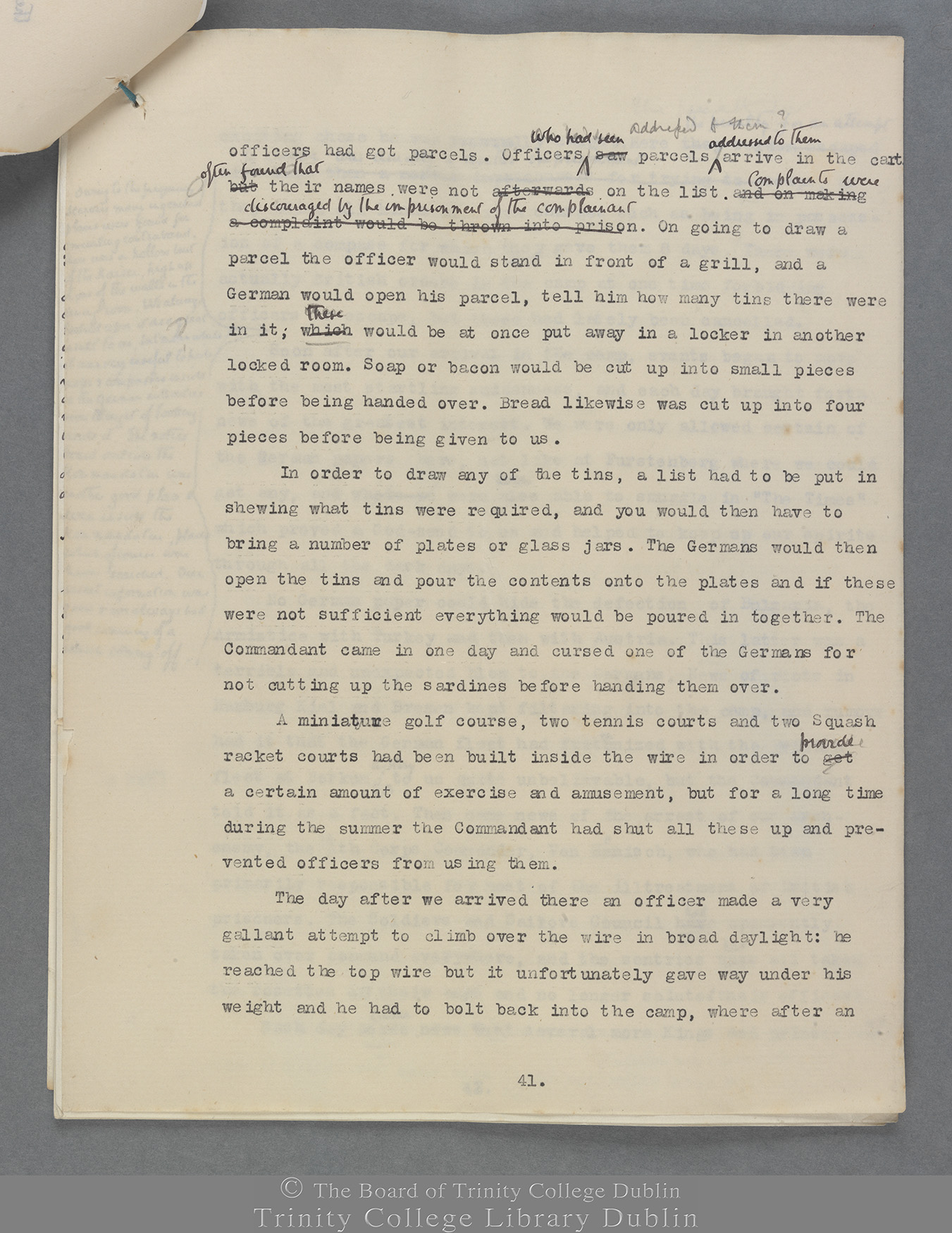[Dec 1918] will not be altogether clear of them for at least two years.
On the fourth day we landed at Leith, thankful to find ourselves once more on British soil.
Fit as Fiddles and as Hard as Nails
Irish soldiers’ voices from the Great War
Author Archives: Lt Col. Charles Howard-Bury
The kindness that we received from the Danes
[12 Dec 1918] Danish officers, who thanked us for all that we had done for their country and made us feel absolutely at home at once. Everyone on board spoke English and their only object seemed <to be> to make us comfortable.
We anchored for the night outside the harbour as it was blowing hard with driving snow and they dared not go through the German minefields in the dark. The following morning we passed safely through the mine fields and after a very rough passage arrived at Copenhagen in the afternoon.
Here we were distributed among the Hotels in and around Copenhagen, and were entertained the whole time free of cost. The hospitality and kindness that we received at the hands of the Danes from the highest to the lowest passes all descriptions and there is not a British Officer who passed through Copenhagen and who will not always treasure a warm corner in his heart for the Danes.
The comforts of civilization, the good food and above all the sense of freedom and the ability to meet with and to talk to different people of the opposite sex proved of the greatest pleasure to us. I do not think that I have ever seen a happier or more contented lot of faces than I saw in Copenhagen.
Our stay there was only for four days, after which we were shipped on board a British transport. On the way through the Katregat and the Skagetack we passed through many floating mines, some of which our escorting cruiser blew up, but the sea they say will
The Commandant came down to the station
[Nov 1918] sent in his place; he proved very fair and just in his dealings to us. He had not been on the Staff, but had been a fighting soldier all his service, having fought in the war on every front and so was quite reasonable, allowing us much more freedom. In many ways however he was very powerless, as he told me that he could not order a fatigue party, without first getting permission from one of his N.C.O’s who was a member of the local Soldaten Rat.
The first week in December was a most depressing one for us: the sun never shone and we remained the whole time in a thick fog. Prospects of departure seemed as remote as ever, when suddenly a telegram came on the 9th to say that we were to be at Warnemunde on the 12th. It did not take us long to get everything down to the station, though among the miscellaneous luggage were dogs canaries and parrots. On the 11th December a special train came up to Clausthal to take the whole camp away. The Commandant came down to the station to wish us goodbye and good luck, and turning to me he said “For you and for your country the future is full of hope and happiness, but for us in Germany there is nothing to look forward to.”
We arrived at Warnemunde the following afternoon, after quite a comfortable journey with plenty of meals on the way. There we were met by three Danish Red Cross ships that were to take us across to Copenhagen. We were welcomed on board by the
The Germans disliked Mad Harry
[Nov 1918] were now allowed much more freedom, & could roam about the country, though towns and villages were out of bounds. There were one or two inns where it was possible on the quiet to get quite a good meal without meal tickets, but the proprietors had to be very careful about doing so, as they were liable to heavy penalties. It was lucky that we could occasionally get a good meal this way, as after the armistice scarcely any parcels arrived at all. They were stolen wholesale en route. Some parcels to my knowledge arrived containing only empty tins and straw; in one case they had gone so far as to eat all the dates, <and> put back the stones into the parcel.
All through November the camp was getting more and more restless, as after the Armistice, we were all hoping to get back very soon, and time dragged dreadfully slowly. We were always expecting that orders might come at any instant for us to go away, but in vain.
Mad Harry left us under the pretext of bad health. He left in civilian clothes and we were told that he tried to get across into a neutral country, but was stopped on the way and sent back to Hanover. The Germans disliked him nearly as much as we did, and I hope he will yet be brought to justice.
<He was succeeded as commandant> by an officer, who had already been at Clausthal, but had been sent away for striking a British Officer. The camp <however> protested against this appointment by not coming on Appel and he was sent away two days afterwards and a Captain Rautmann
The news of that the Armistice had been accepted
[Oct/Nov 1918] resigned or have been deposed: we are truly living through the most wonderful period of history.
The Commandant <told> us that the Revolution is <was> directed against the Upper Classes and that we should be in danger if we go <went> out, but I did not think that this is <was> the case, as German soldiers saluted us now rather than their own officers and as I told them, they ought to thank us for freeing their country for them.
Large numbers of deserters are <were> constantly arriving back from the front, and in Clausthal the Red Flag in <was> flying over the Government buildings. I went down to the Sulphur baths and there got hold of the Armistice terms which I brought back to the Camp. The terms seemed very stiff, but they ensured the disarmament of the country and prevented the <Germans from> renewing the war. The old Military party would never have accepted them, but the peoples Government will have to do so, as they have no <other> alternative.
One of the terms stated that all prisoners of war in this country are <were> to be sent back, so that we may yet be back before Christmas.
The news that the Armistice had been accepted was taken very quietly by the camp, and the Germans were much astonished at our self-restraint. The sentries <had> now become so friendly that they actually allowed an officer to take a shot with <one of their> rifles at a fox that was crossing a neighbouring field. Needless to say, that he missed!
In November the weather became very much colder and we had snow and ice. For some days there was quite good skating <& the canteen made a fortune selling skates> as we
An ingenious place for concealing contraband
[Sept/Oct 1918] exciting chase he was eventually caught. Here the penalty for an attempt to escape was usually a months imprisonment, as they added all kinds of extra charges such as being in possession of a compass for which they gave them 8 days. There were actually British orders in the camp at one time forbidding officers to escape, but these had lately been cancelled.
<Owing to the frequency of searches many ingenious places were found for concealing contraband. There was a hollow bust of the Kaiser, high up on one of the walls in the dining room. We always looked upon it as a great insult to us, but meanwhile it was very useful to hide maps & compasses inside as the German authorities never thought of looking inside it. The notice board outside the Kommandatur was another good place & even inside the Kommandatur, places which of course were never searched. Our secret information was good & we always had good warning of a search coming off>.
Soon after our arrival in the camp, events began to move with the most startling suddenness, and each day brought forth news of the greatest interest. We were only allowed certain of the German papers here, not like at Furstenberg where we could get any, and were even able to smuggle in “The Times” which proved a God-send to us and helped to keep up our spirits through all the dark days.
No German paper could hide the defection of Bulgaria, the Armistice with Turkey and then with Austria. This latter was a terrible and unexpected blow to the Germans, news of riots in Hamburg Kiel and Bremen kept filtering into the camp, and rumour had it that the German fleet had fraternized with the British fleet at Borkum, <a story> to us quite unbelievable, but the Commandant told it as a fact. Then came news of the arrest of our arch enemy the 10th Corps Commander, Von Hanisch, who had been primarily responsible for most of the ill treatment of British prisoners. The Soldiers and Sailors Council had apparently taken over command everywhere, and the sentries had all taken the rosettes off their caps and no longer saluted their officers.
Each day came news that several more Kings and princes had
A miniature golf course had been built
[Sept/Oct 1918] officers had got parcels. Officers <who had seen> parcels <addressed to them> arrived in the cart often found that their names were not on the list. Complaints were discouraged by the imprisonment of the complainant. On going to draw a parcel the officer would stand in front of a grill, and a German would open his parcel, tell him how many tins there were in it; these would be at once put away in a locker in another locked room. Soap or bacon would be cut up into small pieces before being handed over. Bread likewise was cut up into four pieces before being given to us. In order to draw any of the tins, a list had to be put in shewing what tins were required, and you would then have to bring a number of plates or glass jars. The Germans would then open the tins and pour the contents onto the plates and if these were not sufficient everything would be poured in together. The Commandant came in one day and cursed one of the Germans for not cutting up the sardines before handing them over.
A miniature golf course, two tennis courts and two Squash racket courts had been built inside the wire in order to provide a certain amount of exercise and amusement, but for a long time during the summer the Commandant had shut all these up and prevented officers from using them.
The day after we arrived there an officer made a very gallant attempt to climb over the wire in broad daylight: he reached the top wire but it unfortunately gave way under his weight and he had to bolt back into the camp, where after an
There was trouble over parcels
[Sept/Oct 1918] might have been the best and most comfortable camp in Germany but for the fact that there was a bad Commandant there the now notorious Captain Niemeyer. He and his brother were German Americans of the worst type, one was Commandant at Clausthal and the other at Holzminden. Ours went by the nickname of Mad Harry, while the other brother <was known as Milwaukee Bill>. Luckily Mad Harry was on leave when we arrived and so we had only a comparatively mild search. The camp was a larger one than Furstenberg, there being some 240 officers here, partly housed in a hotel building, and partly in three huts.
There was a roll call morning and afternoon, and twice during the course of the night we would be woken up by sentries coming into our rooms to see that we were present. There was a walk <out> for each half of the camp once a week and for some time we were only allowed along the high roads, but when it became evident that <the allies> were winning the war, many of the most vexatious restrictions were gradually relaxed.
There was always great trouble over parcels. At Furstenberg the parcels arrived very well and there were no complaints about them, but at Clausthal their arrival was most uncertain and an enormous number of them were stolen. Officers were not allowed within ten yards of the cart that brought them up from the Post Office, and the parcels were then unloaded into a room with white washed windows so that it was impossible to see what went on inside. Later on a list would be put up shewing what
At last we seemed to be properly winning the war
[Sept/Oct 1918] the news every day provided the most thrilling reading, the great victories in Palestine, the change of the German Government and their offer of an Armistice.
At last we seemed to be properly winning the war and the German people was beginning to know it.
On the 15th day an escort came from Furstenberg with instructions to take us to Clausthal in the Harz mountains, where we arrived towards the end of October. Our journey was quite interesting, as we had a very friendly escort, who was ready do anything for us. We had to drive through Berlin and passed Hindenburg’s statue where the iron nails were hammered in. The populace did not seem to bear us any enmity and many were the smiles that we got on the way through. We had a good but expensive meal in the waiting room and quite a comfortable journey. At Magdeburg some civilian munition makers were rude to us, for which an officer apologised, explaining that all those who had not been to the front were much more bitter against us than those who had fought. At Halberstadt, there were no more trains going on that night, so we went to a decent hotel and spent the night there. They gave us a very good meat dinner and a fair bottle of Bordeaux. The next morning we went on as far as Goslar but finding no more trains going on till the afternoon, we went into the town with our escort and had alook round. From Goslar a mountain railway took us up to Clausthal which lay 2000 feet up in the Harz mountains in very pretty surroundings. This
I protested against this treatment
[Sept/Oct 1918] Among the officer prisoners were three Frenchmen, three Italians, one Belgian and five British Officers, as Lord Farnham, Ashbourne & Howitt who had escaped from Furstenberg also joined us there. Lord Farnham & Howitt – Ashbourne had become separated from them, had made a wonderful journey getting as far as the Kiel canal, but the coal train that they had relied upon to take them across the canal had taken off, & as they were too exhausted to go on, they had to give themselves up.
The time passed quickly enough at Parchim & we had only fourteen days to do. We were in the IXth Army Corps where the treatment was just, and the conditions very unlike those which prevailed in the Xth (Hanover) Command.
One night the Frenchman who was in the cell next to mine, cut the barbed wire that was fastened across his window and escaped. There was barbed wire across the window but no sentry stationed outside his window & the lights in the camp were few & far between, so that once outside there was a very good chance of getting away. I heard afterwards that he was recaptured near the Dutch frontier, having travelled most of the way in a Train-de-Luxe.
The next night besides having a sentry on duty outside my window, I was woken up nine times during the night by sentries that came into my room flashed a light into my face to see if I was really present. I protested against this treatment to the Commandant & was only visited twice the following nights.
Edmundson was able to get some eggs one day from a friendly sentry & he most nobly sent over half of them to me, – the first fresh eggs I had eaten in Germany.
Here we used to get hold of a Hamburg paper and









